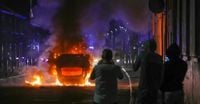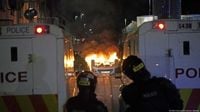For the third consecutive night, Northern Ireland has been gripped by violent unrest, with the town of Ballymena at the epicenter of the turmoil. On Wednesday, June 11, 2025, riot police confronted masked mobs who set fire to homes, vehicles, and even a leisure center in nearby Larne, as tensions rooted in a deeply troubling incident continue to boil over.
The chaos erupted following the arrest and court appearance of two 14-year-old boys charged with the attempted oral rape of a teenage girl in Ballymena, a town of approximately 30,000 residents located about 45 kilometers northwest of Belfast. The boys, who denied the charges through a Romanian interpreter, became the focal point of outrage that quickly spiraled into racially charged violence targeting ethnic minorities.
On Monday night, the unrest began around Clonavon Terrace in Ballymena, where rioters smashed windows and set fire to homes and cars. Police officers faced sustained attacks, with 15 injured that night alone. The violence escalated on Tuesday, with 17 more officers hurt amid a barrage of petrol bombs, fireworks, bricks, and other missiles hurled at them. Riot police responded with plastic baton rounds and water cannons to disperse the crowds.
By Wednesday evening, the disorder showed no signs of abating. Videos circulated on social media purportedly showing a fire at Larne Leisure Centre, a facility that had been providing emergency shelter to families fleeing Ballymena. Authorities confirmed that all families had been safely relocated. Meanwhile, in Ballymena, around 200 people gathered as armored police vans blocked roads. The crowd threw rocks and kicked police vehicles, prompting officers to warn that force would be used against violent individuals.
Police have condemned the riots as "racist thuggery" and are investigating multiple incidents of property damage as racially motivated hate crimes. Four houses damaged by fire during the unrest are under particular scrutiny. Northern Ireland's Chief Constable Jon Boutcher stated, "Hate-fuelled acts and mob rule do nothing but tear at the fabric of our society — they resolve nothing and serve no one." Assistant Chief Constable Ryan Henderson warned that the rioting risks undermining the criminal justice process related to the sexual assault case.
The violence has deeply unsettled the community. Many foreign residents have resorted to displaying signs and flags on their homes to signal their nationality and hope to avoid being targeted. For example, posters reading "Filipino lives here" and British flags have been placed in windows as talismans against attack. Blanka Harnagea, a 38-year-old Czech immigrant, put up a British flag on her living room window, saying, "We’re still here," despite the ongoing threat. However, the violence has forced some families to flee temporarily; David, a 28-year-old Polish man, recounted how a mob smashed his windows and set fire to his living room, forcing him and several others to escape through the back door to the police station.
Local residents are divided in their views. While many condemn the violence, some native Ballymena inhabitants express frustration over immigration and alleged criminality among newcomers. Danielle O’Neill, 32, described the situation as "an invasion" and said, "If they can terrorise our kids we can terrorise the town. It’s a way of getting our voices heard." Her husband, Ryan O’Neill, echoed the sentiment, stating, "If the government won’t put them out, we’ll put them out." Meanwhile, Tyler Hoey, Ballymena’s deputy mayor and a Democratic Unionist party councillor, condemned the violence but criticized the UK government for allowing "busloads" of unvetted immigrants to settle in the town, calling for immigration controls to be addressed.
The political response has been swift and unified in condemnation. UK Prime Minister Keir Starmer told Parliament, "I utterly condemn the violence that we have seen overnight in Ballymena and in other parts of Northern Ireland, including against PSNI officers. It’s absolutely vital that the PSNI are given the time they need to investigate the incidents concerned rather than face mindless attacks as they seek to bring peace and order to keep people safe." Stormont ministers from all parties, including traditional rivals Sinn Féin and the Democratic Unionist Party, issued a joint statement calling the violence "racially motivated" and urged calm. First Minister Michelle O’Neill described the unrest as "pure racism, there is no other way to dress it up."
Police have requested reinforcements from mainland Britain, with approximately 80 officers being called in to assist. The Police Service of Northern Ireland (PSNI) has deployed riot squads equipped with shields, dog units, and drones to manage the situation. So far, six individuals have been arrested for public order offences, and one man has been charged with riotous behaviour.
The unrest has also spread beyond Ballymena, with "sporadic disorder" reported in Newtownabbey, Carrickfergus, and parts of north Belfast. In Carrickfergus, bins were set alight and police were pelted with bottles and bricks by groups of young people. Newtownabbey saw similar disturbances, with fires set at road roundabouts.
Experts note that the violence taps into broader tensions fueled by increased immigration in Northern Ireland, where the foreign-born population rose from 6.5% in 2011 to 8.6% in 2021. Far-right groups and social media influencers have exploited housing shortages and the ongoing cost of living crisis to incite hostility against migrants and asylum seekers. The recent riots are a stark reminder of the fragile social fabric in a region still healing from decades of sectarian conflict.
As Ballymena and surrounding areas begin the slow process of recovery, residents and officials alike hope that calm will return and that justice can proceed without interference. The community remains on edge, with many foreign families grappling with whether to stay or flee, and local authorities preparing for the possibility of further unrest.


